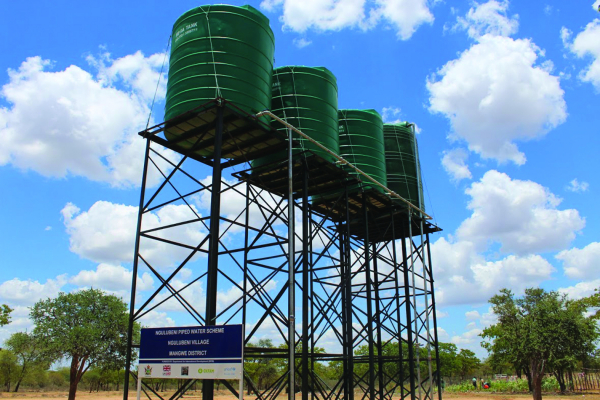
A DILAPIDATED classroom with no window panes, collapsing rooftops, lessons conducted under trees or in grass-thatched huts is somewhat normal in a number of remote Matabeleland schools.
By NQOBANI NDLOVU
Pupils jointly conduct lessons, owing to lack of classrooms and other infrastructure. They also write notes and test exercises on their laps as there are no desks.
It is no surprise that yearly, several of them post zero pass rates, owing to lack of infrastructure and teachers. Twenty-nine primary schools in Matabeleland North province recorded a zero percent pass rate in the 2017 Grade Seven public examinations, in what was seen as a slight improvement from 31 the previous year.
Ngulubeni Primary School in Mphoengs, Mange in Matabeleland South district is one of the many that battled a poor pass rate for years, albeit with properly built classrooms and other infrastructure.
Lack of water, a human right under the Constitution, was a bulwark in enabling the school to post a respectable pass rate, claims Melusi Dube, the Ngulubeni primary school acting headmaster.
“We also battled a high dropout rate as a result. Teachers also shunned this school, while those who were here will not hesitate to seek transfers.
“Pupils will be too tired to concentrate in class after walking several kilometres in search of safe drinking water for domestic use instead of reading, and learning,” Dube told Southern Eye during a recent visit.
- Chamisa under fire over US$120K donation
- Mavhunga puts DeMbare into Chibuku quarterfinals
- Pension funds bet on Cabora Bassa oilfields
- Councils defy govt fire tender directive
Keep Reading
The school was officially opened in 1993, and lies about seven kilometres away from Ramoegwebane River on the border between Zimbabwe and Botswana.
“Teachers and pupils alike walked seven kilometres to fetch water, disturbing disrupting lessons in the process. This affected our pass rate in a big way as instead of focusing on learning, we will be worried about drinking water,” he added.
Ngulubeni villagers, pupils and teachers fetched water at the seven kilometres-away river owing to lack of clean water sources nearby.
Wild animals roam the area, villagers said, exposing them and their children to attacks when walking to Ramoegwebane to fetch water.
The Constitution of Zimbabwe in its Declaration of Rights enshrines socio-economic rights, the so-called second generation rights, and among them is the right to water.
According to section 77, “every person has a right to (a) safe, clean and potable water and the State must take reasonable legislative and other measures, within the limits of the resources available to it, to achieve the progressive realisation of this right.”
The United Nations General Assembly also explicitly recognises the human right to water and sanitation and acknowledges that clean drinking water and sanitation are essential to the realisation of all human rights.
The UN calls upon States and international organisations to provide financial resources, help capacity-building and technology transfer to help countries, in particular developing countries, to provide safe, clean, accessible and affordable drinking water and sanitation for all.
It is a right that Ngulubeni villagers said government denied them for years until non-governmental organisations rescued them.
“Villagers across the river in Botswana, some few kilometres from Ramoegwebane have had no problems with water, a clear sign their government cared.
“To us, the government never cared. It’s all a sign of an uncaring government as water is right, and one would expect to see government officials to be seized with the matter but alas for so many years,” said Liveson Phiri (61) who is now the community operator of Ngulubeni’s solar powered piped water scheme.
The scheme, installed and commissioned late last year, was funded by the Oxfam, UKAid and Unicef to a cost running into several thousands of dollars.
Underground pipes have been laid for use to draw water using solar powered engines from Ramoegwebane River to Ngulubeni primary school and sparsely installed community taps to serve about 260 homesteads, bringing to a total of 1 690 direct beneficiaries.
Four 5 000-litre tanks commonly referred to as Jojo tanks have been mounted outside the school for use by the school’s teachers and pupils.
“Villagers provided the labour in digging the trenches and laying the underground pipes among others. We also installed water meters per each community tap to manage consumption purposes. The water they now draw from the taps is mainly for domestic use, and for small garden projects,” said Kudakwashe Murambadoro, the Public Health Engineer for Oxfam in Zimbabwe in Bulilima and Matobo districts.
The Oxfam has also installed piped water schemes in Ratanyana and Marinoha in Matobo District and Makhuzeze in Mangwe.
“This Ngulubeni scheme pumps (solar powered engines) 5000 litres per four hours. It is designed to pump non-stop for four hours, but it can run up to seven hours. It’s purely solar, no batteries or anything of that kind. We also dug trenches around the solar panels and engines to prevent them from being destroyed by elephants, and other wild animals,” he added.
Ngulubeni primary school acting head and villagers said the solar water piped has not only with a nearby water supply source but for their gardening projects.
“Agriculture is part of the curriculum, and this water scheme could not have come at a better time than this as we now have some garden projects not only for learning, but for resale of whatever produce,” the acting headmaster said.











